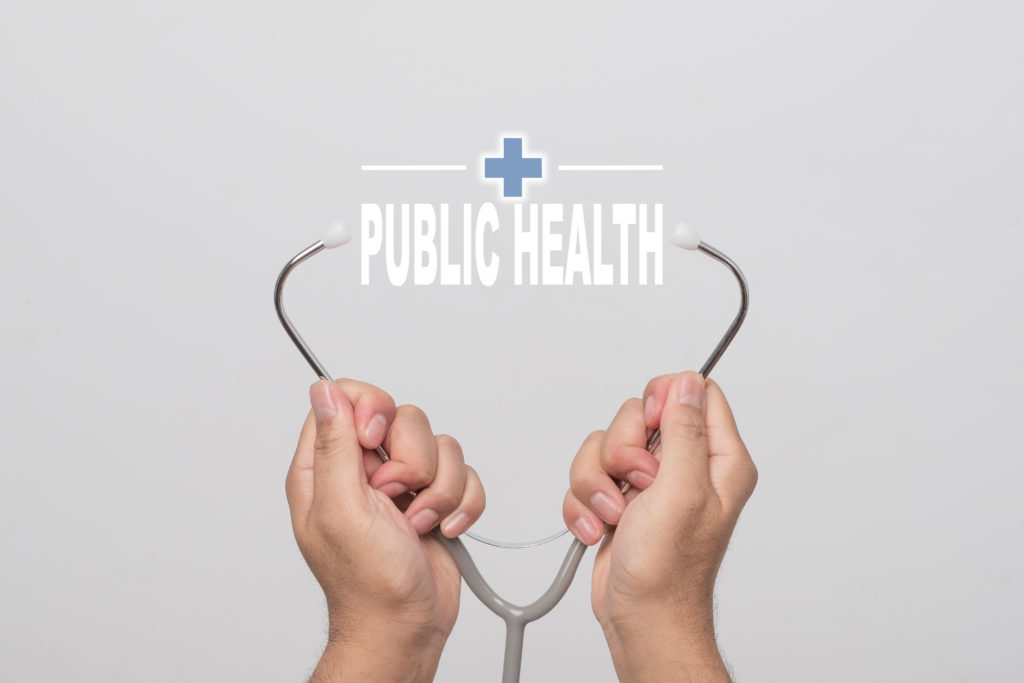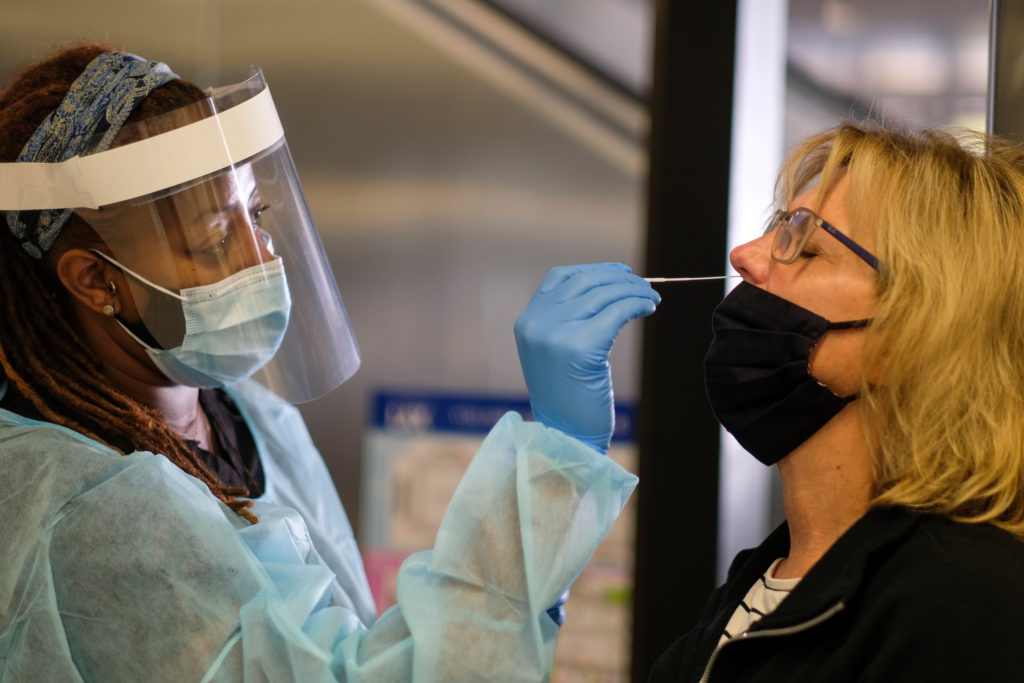Public health nurses comprise the largest professional segment of the workplace in public health and are involved in the prevention, education, advocacy, activism, assessment, and evaluation of Public Health. They hold a vital role in the prevention of disease and help to promote community health and safety.

For students already in a nursing program or who are already practicing nurses, public health nursing offers various opportunities to make significant changes in public health. While most nurses care for one patient at a time, public health nurses care for entire populations. Working with whole communities allows public health nurses to help educate the community about health issues that can improve their health and safety and facilitate access to care.
Featured Programs
What Is a Public Health Nurse?
A public health nurse looks at many factors when assessing illnesses or injuries. Instead of waiting for patients to come to them, they are active in their communities to help improve the health of the population. Because they are trained as registered nurses, they can offer accurate and helpful information about how people can protect their health.
A primary focus of public health nurses is on education. They work with senior centers, community groups, schools, and other organizations to inform people about important health issues. They may demonstrate various safety practices, teach family members how to care for disabled or sick loved ones, or encourage people to get tested or vaccinated against diseases. They work to make health information accessible for individuals to understand so they can make informed choices about their health.
Rural or low-income communities benefit from public health nurses who may teach prenatal and baby care, immunize children at school, help the elderly stay safe, and more. During a health crisis or emergency, you will often find public health nurses on the front lines.
What Does a Public Health Nurse Do?
For a public health nurse, the ultimate goal is to promote public wellness, preventing illness and disease, and reducing health risks within the population. Their role may be focused on only a few specific tasks, or they might be a jack-of-all-trades in their communities. In general, the responsibilities of public health nurses include:
- Assessing health trends to identify health risk factors specific to communities
- Assigning priorities for health-related interventions to provide the most significant benefit
- Advocacy with local, state, and federal authorities in improving access to health services in underserved communities
- Design and implement health education campaigns and activities for disease prevention
- Provide information on local health programs and services that are available to improve access to care
- Providing direct health care services to at-risk populations
- Recording and analyzing medical data
- Developing relationships with patients and following up with care
- Managing the budget of various community health programs
- Referring people to other related services
- Delivering medical care when needed

What Is the Job Outlook and Salary Range for a Public Health Nurse?
There is a growing demand for public health nurses, particularly in those low-income communities that are medically underserved. Many government agencies have recognized the benefits of preventive and health education services provided by public health nurses in reducing overall healthcare costs. Because they often serve a diverse population, Bilingual nurses who are fluent in Spanish and English are desperately needed.
According to the U.S. Bureau of labor statistics, the average annual salary for a public health nurse is $75,330. However, salaries can vary significantly due to company, location, industry, experience, and benefits. Salaries also vary greatly depending on job location, educational level, and requirements.
There is some career stability in this role as well, since the demand for public health nurses is expected to increase seven percent through 2029. This is much faster than job growth in other sectors and close to 222,000 new positions in the field are expected to open up.
What Are Some of the Areas of Employment For Nurses in Public Health?
Public health nurses are employed in government agencies, nonprofit organizations, community health centers, and other organizations improving health at a community level. They may work alone or on multidisciplinary teams, and they often supervise other health care and lay personnel. In addition to working with communities, they work behind the scenes planning activities, managing budgets, and evaluating the effectiveness of public health programs.
See also: Are There Areas of Specialization With a Master of Public Health Degree?
Where Do Public Health Nurses Work?
Public Health Nurses work in a variety of settings, including:
- Outpatient and community clinics
- Government organizations
- School systems
- Nonprofit organizations
What Degree Should I Pursue to Work as a Public Health Nurse?
Those who wish to enter the field of public nursing will need at least an associate degree in nursing to get started, but a bachelor’s degree is preferable. However, to work as a nurse in public health, a Master’s Degree in Nursing (MSN) or a Master’s Degree in Public Health (MPH) is strongly advised. Public health nurses pursuing an MPH also may choose to pursue a specialization in public health, such as epidemiology, biostatistics, environmental health, etc.
See also: How to Advance from a Bachelor of Science in Nursing to Public Health Nursing
The most common pathway to becoming a PHN involves these steps:
1. Obtain an associate degree in nursing (ADN) or a Bachelor of Science in Nursing (BSN) from an accredited institution
2. Earn an R.N. licensure by passing the NCLEX-RN exam. The exam is administered by the National Council of State Boards of Nursing.
3. Complete one of the following necessary public health certification requirements:
- A Bachelor’s degree in any concentration with at least five years of relevant public health experience
- A graduate degree with at least three years of public health experience
- A certificate from a public health accredited program and at least three years of public work health experience
4. Although it is not a requirement, you may want to pass the Certified Public Health (CPH) exam. This voluntary credential demonstrates your interest in the field and is preferred by many employers.
What Is the Difference Between a Master’s Degree in Nursing (MSN) and a Master’s Degree in Public Health (MPH)?
Both an MSN and an MPH can offer many excellent opportunities to practice your nursing skills and make a difference in your community and in the lives of others. At first glance, it may seem like these two degrees are nearly the same. However, there are some primary differences to consider before you decide which way to go.
An MSN will give you the skills you need to take care of individual patients and their families, while an MPH is structured to provide you with the skills needed to prevent disease and illness in whole populations. We’ll examine each of them closer in this section.
MSN Degree
A Master of Science in Nursing (MSN) is an advanced nursing degree for registered nurses and the doorway to high-paying healthcare careers. While it takes between two to three years to obtain an MSN, it is worth considering since it is likely to impact your career substantially. It’s for R.N.s who want to enhance their currents skills to provide an advanced level of care to their patients and will give you the knowledge to practice in advanced nursing practice positions, including:
- Nurse Anesthetist
- Nurse Practitioner
- Nurse Midwife
- Nurse Educator
- Nurse Executive
- Psychiatric Nurse Practitioner
- Clinical Nurse Specialist
There are plenty of terrific online MSN programs for those who want to pursue this career path, and the curriculum depends on whoever specialty you choose (CRNA, NO, CNM, etc.). Typical courses may include:
- Population Health
- Fundamentals of Nursing Informatics
- Advanced Pharmacology
- Foundational Concepts and Applications
- Primary Care of the Childbearing Family Practice
- Theoretical Basis for Advanced Nursing Practice
- Advanced Pathophysiology
- Advanced Physical Assessment
- Healthcare Policy
- Advanced Research Methods – Evidence-Based Practice
It takes two to three years to complete an MSN degree, and students are required to complete several hundred clinical hours before passing a national certification exam.
See also: Top 25 Best MSN Nursing Education Degrees Online
Featured Programs
MPH Degree
A Master’s Degree in Public Health (MPH) is for those who have more of an interest in the border scope of public health. The focus is more on efforts to improve and protect whole communities rather than individuals. This graduate-level public health degree hones in on education about diseases and illness, healthy living, and science. Those who pursue an MPH can choose from a wide range of occupations, including:
- Biostatistician
- Epidemiologist
- Environmental health scientist
- Community health worker
- Global health worker
- Health Educator
- Health Services Administrator
- Clinical Research
There are many specializations with an MPH, and students will typically take courses like:
- Infectious Disease Epidemiology
- Data Analysis (SAS & STATA)
- Bioinformatics
- Behavioral Epidemiology
- Chronic Disease Epidemiology
- Detection and Control of Sexually Transmitted Infections
- Program Evaluation and Research
- Biological Threats & Terrorism
- Environmental Health sciences
- Health services administration
- Biostatistics
See also: Top 25 Online MPH Programs (Master’s in Public Health)
What Skills Should a Public Health Nurse Possess?
Public health nurses are individuals who are highly dedicated to working to improve their community’s health and access to care. They must be able to work well with large groups and be sensitive to cultural differences.
Communication and critical thinking are also crucial in this role, as is the ability to juggle many tasks at once. Those who do well in public nursing generally have a passion for positively influencing others’ lives. They are problem-solvers who like to affect change.

What Do Public Health Nurses Do To Continue Their Education?
For public health nurses to retain their license, they have to take part in continuing education (C.E.). C.E. is post-secondary learning and is a requirement within the field to ensure that PHNs stay current with new knowledge and research. C.E. may include conferences, self-directed learning, on-the-job training, degree credit courses, experiential learning, etc.
Public health nurses who wish to advance their careers should also consider taking advantage of continuing professional development (CPD). CPD is designed to help employees hone their current skills and become more competent in their respective positions. While not a requirement, CPD can undoubtedly help open doors to new and more lucrative posts.
Professional Certification
There is a wide range of professional certifications that public health nurses can look into. These certifications can earn you a document that proves you’ve mastered a set of skills or achieved new levels of knowledge pertaining to your field.
If you’re curious about what public health certifications are available to you, look into professional organizations like:
National Commission for Health Education Credentialing
Association for Healthcare Administrative Professionals (AHAP)
Association of Community Health Nurse Educators (ACHNE)
Association of Public Health Nurses (APHN)
American Public Health Association (APHA) – Public Health Nursing Section
Alliance of Nurses for Healthy Environments (ANHE)
What Are the Pros and Cons of Working As a Public Health Nurse?
While there are many advantages to focusing your nursing career in public health, there are also some significant challenges to be aware of. Before making a final decision about studying public health nursing, weigh these pros and cons carefully.
The Pros
Job Satisfaction
Science tells us that when we are helping others, it makes us happy. Being involved with your community as a public health nurse can offer the opportunity to bring meaning and joy into your life and help you create social change about important issues.
The People
If you are a people person, your role as a public health nurse will put you on the path of a diverse swath of individuals. From suburbia to underserved rural neighborhoods, this role will give you a broad understanding and empathy for humanity.
The Pay
While certainly not the highest paying position in public health, PHNs do make a decent living and are likely to have substantial benefits packages as well.
The Cons
It Requires a Lot of Patience
When you’re working to remove barriers to good health, sometimes a situation can seem hopeless. Public policy can be slow to change. Succeeding as a public health nurse requires patience to see things through to the finish line
Bad Health Habits
No matter where you are working as a public health nurse, you will encounter people with some serious health issues, some of which are preventable. You may feel particularly helpless when it comes to convincing those with poor health how to improve their lives, which can lead to cynicism.
Resources May Be Limited
Often, impoverished urban and rural communities will have scarce resources to work with. The budget may be minimal, and it can be challenging to stretch it to do your role effectively. You may often be short on space, supplies, or assistance, leading to frustration and burnout.
Closing Thoughts
A role as a public health nurse can be an incredibly meaningful way to contribute to the world at large. Public health nurses demonstrated the crucial role they play in mitigating a health crisis during the recent COVID-19 pandemic. They acted in the capacity of first responders, delivering non-judgmental, effective, and safe care within the communities they served. If you are looking for a rewarding career in public health, working as a public health nurse might be an excellent career for you.
You might also like:
Can I Pursue a Career In Public Health If I Don’t Know What I Want to Do?
How is the Job Outlook for the Public Health Field?
I Am Currently A Nurse, What Do I Need To Do To Become A Healthcare Manager?